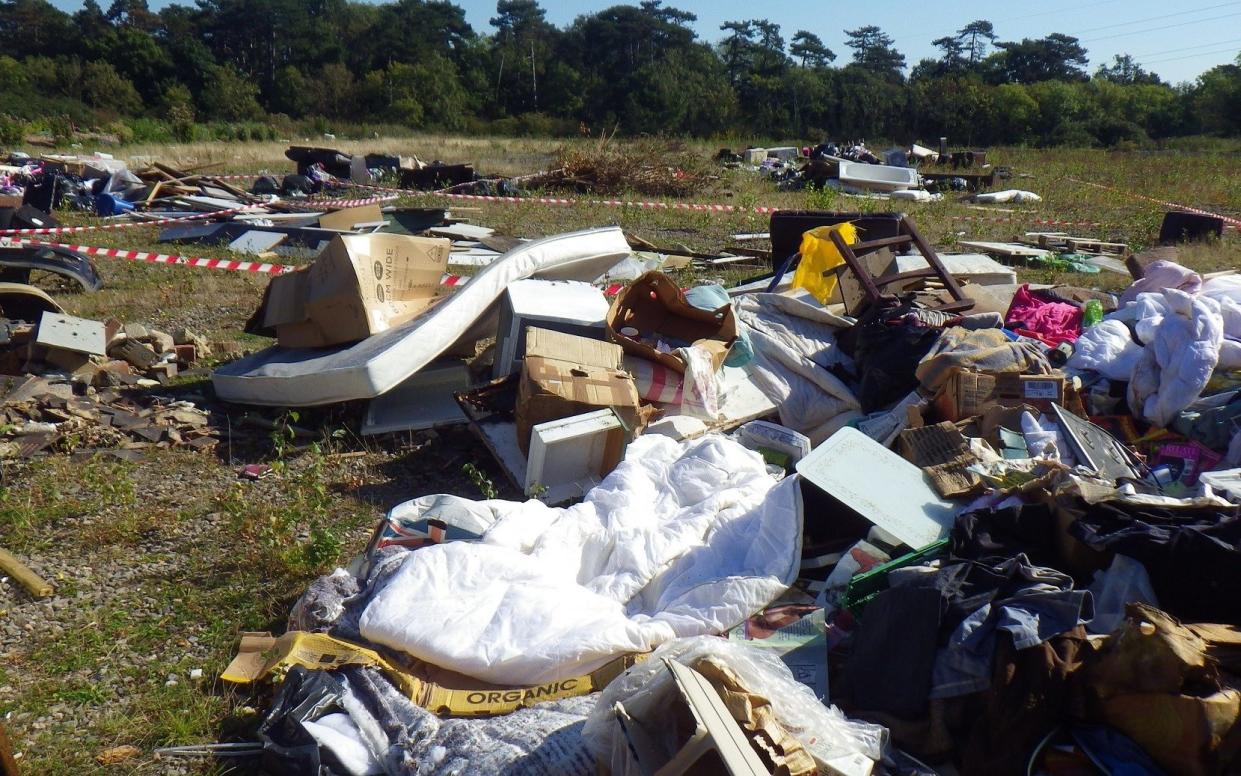Jeremy Paxman accuses government of being 'appallingly inept' at tackling fly-tipping and litter

Jeremy Paxman has accused the government of being “appallingly inept” at tackling fly-tipping as new figures show less is being done to protect the environment than ever before.
Environment Agency enforcement notices, which are used to target major breaches of regulation including fly-tipping and water pollution, are at the lowest since 2013, as far as the data goes back.
The agency issued just 61 enforcement notices in the 2018/19 period, compared to 200 in in 2012-13, according to data from campaign group Unchecked UK.
Recorded fly-tipping incidents have reached their highest in a decade, with an average of nearly 3,000 every day in 2018-19, at a cost to taxpayers of around £57m.
But the number of warning letters issued by English local authorities have dropped 60 per cent since 2010.
John Read, the founder of campaign group Clean Up Britain said there had been only one successful prosecution of fly-tipping in 2018.
“The Environment Agency - part of Defra - is fundamentally failing in its duty to prosecute fly-tippers,” he said. “It’s a Conservative government talking tough and acting weak.”
Responsibility for clearing up and controlling fly-tipping falls between the Environment Agency and local authorities.
The Environment Agency has the power to serve enforcement notices requiring that businesses rectify any breaches of environmental law.
Enforcement notices can be followed by prosecution and are therefore considered a key tool in ensuring compliance with environmental regulations.
Jeremy Paxman, a patron of Clean Up Britain, wrote to the chair of the Defra Select Committee earlier this month to call for an inquiry into the issue and for reforms of the government approach to fly-tipping.
In a letter co-signed by Mr Read, Mr Paxman said Defra had been “appallingly inept and relentlessly incompetent” at tackling the problem of littering and fly-tipping.
In response, Neil Parish MP, chair of the committee, said the issue would be kept under review.
In its report, Unchecked UK highlighted cuts to the country’s enforcement bodies, and said they were facing growing difficulty in overseeing health and safety, and food standards, as well as environmental regulations.
Natural England, which monitors damage to Sites of Special Scientific Interest, faced a 72 per cent funding cut between 2009 and 2019.
"The erosion of UK environmental enforcement capacity over the last decade has been staggering,” said Emma Rose, the director of Unchecked UK said. “Huge declines in regulatory budgets and staff have been accompanied by plummeting enforcement across the spectrum.”
“The fly-tipping endemic illustrates the consequences of this enforcement gap.”
Mrs Rose said there were “important political choices to be made” if the government wants to achieve its environmental ambitions.
“Clearly, ambitious regulations are only as good as the enforcement which underpins them,” she said.
The Country Land and Business Association said the decline in enforcement and prosecution over pollution incidents was worrying, but "not surprising" in the context of funding cuts to the EA and Natural England.
Sarah Hendry, Director General of the Country Land and Business Association said: “Responsible rural businesses rely on fair and rigorous enforcement so that they operate on a level playing field and are not undercut by those who cut corners.
“Brexit offers the opportunity for new approaches to regulation that incentivise responsible businesses and target and punish the real offenders”
An Environment Agency spokesperson said: “The Environment Agency takes proportionate enforcement action to bring businesses back into compliance and to prevent and disrupt criminal activity.”
“In the last year alone, we handled 76,777 environmental incidents across the country – one every seven minutes – from floods to oil spills and fish kills. All incidents are taken extremely seriously and every single report is investigated by our dedicated officers.
“We will always seek to hold to account those responsible for serious environmental harm. In 2018/19, we prosecuted 77 counts of waste crime, resulting in eight prison sentences and nearly £450,000 of fines, and won five successful prosecutions against water companies, with total fines of over £2 million.”
Natural England said its ability to monitor sites and crack down on damaging activity on SSSI was constrained by its resources.
Dave Slater, Natural England’s Director for Wildlife Licensing & Enforcement Cases, said:
“England’s Sites of Special Scientific Interest are the best wildlife and geological sites in the country and are protected by law. Owners and occupiers of SSSIs must seek consent from Natural England for any activity that may cause damage to these unique areas.
“We work very closely with land managers to positively manage these special places, but will always take action where there is evidence of damage or inappropriate management.”


